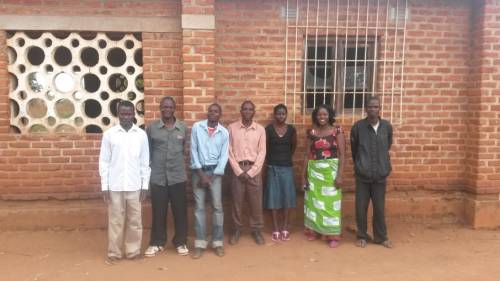A letter from Luta Garbat-Welch serving in Malawi
May 2017
Write: Jeremy Garbat-Welch
Write: Luta Garbat-Welch
Individuals: Give online to E200515 for Jeremy and Luta Garbat-Welch’s sending and support
Congregations: Give to D507577 for Jeremy and Luta Garbat-Welch’s sending and support
Churches are asked to send donations through your congregation’s normal receiving site (this is usually your presbytery).
When we returned from the All Africa Gathering in Rwanda for PC(USA) mission co-workers serving in Africa, we knew, looking at the dissolved pieces of the wooden base of my grain mill, that the termite tubes (look it up!) we had seen slowly crawling up our kitchen wall could no longer just be brushed off; a termite infestation had truly taken hold and it was time to get help. It also seemed like the right time to fix the kitchen wall, which had water damage from the rotting roof beam connecting our house to our adjoining neighbor’s house.
As many of you have probably experienced, it is not unusual for fixing something in the house to take longer than expected or to have some unexpected twists and turns in the process, and such was the case for us. In the midst of frustration, I kept trying to remind myself that this is probably typical wherever you are in the world. My in-laws lived out of a makeshift kitchen in their living room and garage for months while their kitchen was redone. But I found myself being emotionally exhausted by the process and feeling larger than appropriate amounts of anger. As I reflected on my frustration and my responses to that frustration, I began thinking more and more about the term cultural fatigue.
The most often used definition of cultural fatigue is “the physical and emotional exhaustion that almost invariably results from the infinite series of minute adjustments required for long-term survival in an alien culture” (from Culture Shock by Alfredo and Grace Roces). An online blogger put it more directly: “The constant attention that you must pay to even the most minor inter-cultural interactions seems to take more effort than what it’s worth, when you get sick of trying to figure out another society and/or your place in it, when the struggle for respect becomes too annoying to continue, or when constantly cross-examining yourself as to whether you took the right action in the right situation becomes unbearable. Cultural fatigue can be defined as a state of being where the small, adverse intricate [things] of the culture begin to bother you out of reasonable proportion after living in another country for an extended amount of time” (“Vagabond Journey”).
For me, in addition to making mistakes because I don’t know the unwritten rules or assumptions that people work off of, being frustrated when what I thought I had communicated clearly is not understood how I intended it or wondering constantly if I made a mistake or handled a conversation or situation appropriately, it has included daily annoyances. Little things such as kids miming how to eat a guava (as if I don’t know what a guava is!); being yelled at when I’ve pulled off to the side of the road to buy mandasi (donuts) even though this is something Malawian drivers do in front of me every day; having to be gracious over and over when people are surprised that I use a chimbudzi (pit latrine), not only eat but cook nsima (the staple food) and wear my child on my back with a chitenje.
When I reflect on the deeper reasons for my cultural fatigue, I see in myself a desire for belonging and acceptance, and my own sense of pride—being tired of people believing that I don’t know anything, wanting to be valued for who I am and not as an oddity. I think this need for belonging and acceptance and tendency toward pride is universal. I also think that, as a third cultural kid (TCK)—I’m a child of former PC(USA) mission co-workers—I feel it deeply. In truth, I have cultural fatigue in every country I live in because I have no home and because all places are home.
The opposite of cultural fatigue is cultural humility. Cultural humility was coined in the healthcare field to take the concept of cultural competency one step further. Cultural humility is adopting a posture of lifelong self-evaluation; it’s understanding that we will never fully understand someone else’s culture and that others always have something to teach us.
There are days when I balk at putting myself in this continual posture of self-evaluation and learning—it feels like I’m having to learn every second of the day. It has been helpful for me to remember the words of a professor of mine in college—“humility is having an accurate assessment of yourself” (Dr. Ron Pyle). Choosing daily to learn graciously from those around me, to accept that this is not my culture and that therefore I am the student, puts me in an accurate position, the right position. It is the biblical position. And it’s the role we encourage Community Health Evangelism (CHE) Trainers to take—to be a facilitator, to allow others to share and find their knowledge, rather than imparting knowledge.
Philippians 2:3-8 (NRSV):
Do nothing from selfish ambition or conceit, but in humility regard others as better than yourselves. Let each of you look not to your own interests, but to the interests of others. Let the same mind be in you that was in Christ Jesus,
who, though he was in the form of God,
did not regard equality with God
as something to be exploited, but emptied himself,
taking the form of a slave,
being born in human likeness.
And being found in human form,
he humbled himself
and became obedient to the point of death—
even death on a cross.
The reality is that cultural fatigue is a part of living life cross-culturally, and we as mission co-workers have to find ways to move out of this fatigue. Choosing to embrace cultural humility is one way; another way for me has been to focus on the things that I love. And the truth is I love so much about living in Malawi. I love how people easily take my child and pass him around. I love that taking my child to a funeral is acceptable and expected, allowing me to participate in community life without shame. I love the smiles of my neighbors and their warm greetings as I pass them on the street. I love the relationships, surface-level as they might be, with the market vendors from whom I purchase my produce. I love that friends simply stop by to check on us when they hear we are sick. I love the way people exclaim “ay ya” when they agree with you. I love the beautiful lake, the mountains, the rocky outcroppings, the acacia trees and the agama lizards bobbing their heads on my wall. I love how music is a part of everyday life. I love the opportunities for transformation that I see all around and the people who dream and work to bring about this transformation.
One of the people I cared for, who gave me hope because she dreamed big and worked hard—Elida Mphedwa, the CHE Coordinator for NKhoma Public Health—died very suddenly and unexpectedly a couple of weeks ago. My fatigue has grown deeper as I have grieved for her, for her family and for the CHE program. Some days I feel that fatigue settling in my bones. But then I get e-mails from you, our supporters, telling me that you are joining me in prayer for Elida’s family, that you are praying that God will raise up new leaders to work with CHE initiatives. And I remember that we are all God’s children daily striving to serve the Lord where God has placed us. That God is with us, wherever we are, and that in the end God will prevail. And that these big dreams of Elida’s are God’s dreams and will continue.
Thank you for your prayers for us as we continue to trust in the Lord amidst the fatigue. Thank you for your prayers for the work of our partner churches, the people they serve and their families. It is a blessing to be one with you and the church worldwide.
In Christ,
Luta (for all of us)
![]() You may freely reuse and distribute this article in its entirety for non-commercial purposes in any medium. Please include author attribution, photography credits, and a link to the original article. This work is licensed under a Creative Commons Attribution-NonCommercial-NoDeratives 4.0 International License.
You may freely reuse and distribute this article in its entirety for non-commercial purposes in any medium. Please include author attribution, photography credits, and a link to the original article. This work is licensed under a Creative Commons Attribution-NonCommercial-NoDeratives 4.0 International License.

